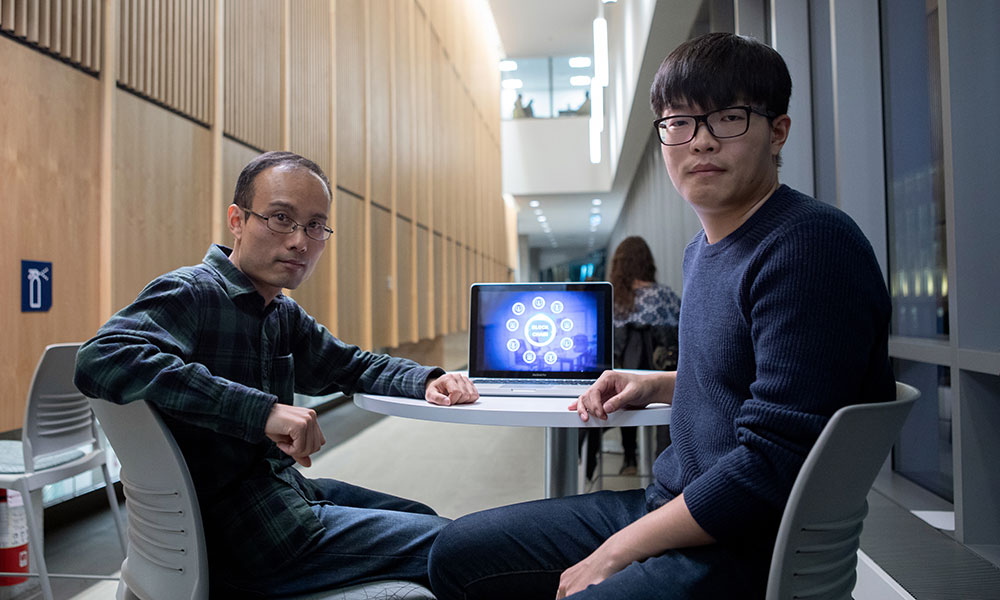
IN OCTOBER 2019, A CYBERATTACK STRUCK the computer systems of Canada’s largest laboratory testing company. About 15 million customers, mainly in British Columbia and Ontario, were potentially affected, and the company had to pay ransom to retrieve the sensitive information.
These types of breaches are becoming increasingly common. Almost daily, media reports mounting consumer distrust of large, centralized platforms that aggregate data and use it for secondary purposes without individuals’ knowledge or consent.
UBC researchers believe an emerging technology called blockchain can help enable the next generation of internet by providing security and trust in the handling of data. Its decentralized computing architecture and cryptography can allow people to share money, intellectual property, health records, land titles, social insurance numbers or any personal data with reduced risk to their data privacy and security.
Since 2016, Blockchain@UBC—a cluster of research excellence developed by Associate Professor Victoria Lemieux—has been exploring in-depth research and collaboration between industry and academia. Comprised of 35 faculty members and hundreds of affiliates across both of UBC’s campuses—including UBCO Assistant Professor Chen Feng—the cluster aims to collectively advance blockchain technology and train UBC graduate students to play leading roles in the evolution of this rapidly-emerging and disruptive new technology.
COVID-19 Brings New Challenges
Globally, the COVID-19 pandemic has raised important questions about data accuracy and personal privacy, as governments and health officials attempt to balance protecting patient privacy with providing the public real-time information about COVID-19 cases.
“This pandemic has exposed the importance of having accurate and timely information about public health,” explains Chris Rowell, a postdoctoral research and teaching fellow at the UBC Sauder School of Business. “But, our traditional methods of collecting, recording and sharing this information has compromised personal privacy.”
He says that blockchain and other similar distributed ledger technologies could be part of a solution to this tension, since these technologies enable governments to collect and analyze trustworthy information in real time while also protecting personal privacy.
Rowell points to the example of a health certificate, in which a card or document is issued by a medical professional to people who have had a negative coronavirus test result. Such a certificate is currently required by numerous countries in their attempt to limit the spread of COVID-19 from international visitors or returning citizens.
“In this case, the health unit could issue a physical certificate, but as we all know, these can be easily falsified, jeopardizing the trustworthiness of all the certificates,” explains Rowell. “But if an immunity certificate is issued by a medical practitioner directly into a blockchain-secured account, you can control your medical information and can prove your health status in a trustworthy way.
“Blockchain-based permissions could also be configured to only share a yes/no answer; for instance, ‘have you tested negative to COVID-19 in the past three days?’ This credential would be issued to your account and then you can show people the result on your phone. The rest of your private information, like name, address or date of birth aren’t revealed,” Rowell adds.
These issues—and many more—were explored during UBC’s fourth-annual Blockathon for Social Good, a hackathon-type design challenge where teams devised blockchain-based solutions to address various issues related to the pandemic. The blockathon formed the capstone of UBC’s yearly Summer Institute — offered by Blockchain@UBC and other university partners—which brings together distinguished guests from academia and industry to share blockchain insights with a diverse cohort of students.
Rowell says that the learnings and discoveries students made during the Summer Institute and Blockathon illustrate that many governments and organizations weren’t ready for the pandemic, and there’s still much work to be done.
“Despite their promise in addressing issues around data privacy, transparency, security and sharing, there are still substantial challenges in implementing blockchain and other distributed ledger technologies,” Rowell explains. These include regulatory hurdles, fit with legacy systems and processes, the maturity of complementary technologies and consumer readiness, among other factors.”
Connecting Students with Industry
Blockchain@UBC has attracted over $3 million from government and industry partners, including a six-year commitment from Mitacs that has seen the not-for-profit match industry funding for up to 18 master’s and eight PhD internships on an annual basis. In addition, a recent $1.6 million Collaborative Research and Training Experience (CREATE) award from the National Sciences and Engineering Research Council (NSERC) has further enabled graduate training in blockchain technology to complement master’s and doctoral degrees in a wide range of disciplines.
The CREATE funding helps run Blockchain@UBC’s annual Summer Institute, and will also enable a longer-term research-based program supported by diverse industry partners. “Our trainees will push blockchain applications to the next level,” explains Feng, an assistant professor in UBCO’s School of Engineering.
PhD student Fangyu Gai is one of the students benefitting from the breadth and depth of the Blockchain@UBC program, which is equipping him with the skills needed to lead and innovate in digital currency. He moved to UBCO from China specifically to work with Feng on the technical aspects of blockchain. His research focuses on the scalability of blockchain systems such as Bitcoin and Ethereum.

Assistant Professor Chen Feng with PhD student Fangyu Gai.
Bitcoin is the first known blockchain application. The digital currency came into the public eye around 2010 and—despite being both hyped and denounced by speculators—has changed the world, enabling people to make micropayments to friends and family members living in other countries at significantly reduced transaction fees.
But if the world wants Bitcoin and other potential applications to become mainstream, the technology must advance, explains Gai.
“The throughput of current blockchains like Bitcoin is very slow,” says Gai. “They only process several transactions per second. In my research, I developed second-layer protocols built on top of blockchains, called sidechains, that allow them to run 1000 times cheaper and faster.”
For the first time, Gai is also conducting collaborative research directly with an industry partner. He is working with Dapper Labs, a BC-based company that aims to introduce consumers to the value of blockchain technology through fun and games.
“This is a very exciting experience for me,” says Gai. “Dr. Feng, another student and I proposed our own algorithms that we are developing now. My mentor from Dapper Labs is a very experienced system architect, and I have daily meetings with the team to plan and discuss where our project is going.”
The first-of-its-kind in Canada, Blockchain@UBC is now recognized as the world’s most interdisciplinary, research-intensive academic graduate program focused on blockchain.
The opportunity to apply research under the guidance of industry experts is helping Gai and others build marketable skills. “It’s the kind of learning experience that you might expect to find available in Dubai, London or New York,” observes Gai.
Feng says that students like Gai will graduate with the knowledge and expertise demanded by blockchain employers, who will be looking not only for developers but also business and technical consultants, software engineers, cybersecurity strategists, project managers and marketers across a diverse array of industries such as finance, retail, supply chain and healthcare.
The Blockchain@UBC research excellence cluster is now recognized as the world’s most interdisciplinary, research-intensive academic graduate program focused on blockchain, and is the first in Canada. It includes researchers from Computer Science; Electrical and Computer Engineering; Medicine; Economics; Law; the School of Public Policy and Global Affairs; the UBC Sauder School of Business; and the School of Information, as well as more than 400 affiliates from UBC’s student population, research community and industry.
“We’re unique in that we take a three-layer view of blockchain: the technical layer looks at core engineering issues like scalability, efficiency and speed; the data records layer explores information governance issues, such as how we protect and trust records while ensuring data privacy; and the social/business layer evaluates the innovation ecosystem and ethical and legal issues,” explains Feng.
“Then, in parallel with the three layers, we’re examining four vertical areas of interest: clean energy, regulatory technology, healthcare and Indigenous issues.”
Trading Clean Energy
Feng—who received a 2020 Principal’s Research Chair in Blockchain-empowered Digital Technology—is also working in partnership with FortisBC to build a blockchain-enabled peer-to-peer system for trading renewable natural gas. FortisBC has teamed up with local farms, landfills and municipalities to capture biogas from decomposing organic waste and purify it to make renewable natural gas. The utilities company then injects this sustainable energy source into its system; participating customers can choose to use five, 10, 25, 50 or 100 per cent renewable natural gas for use in their homes and businesses.
Feng is working with FortisBC to create a distributed blockchain solution that will securely manage the transactions involved in trading energy, so that customers can be credited for what they put into the system and for what they take out in real time.
Research and Training for the ‘Internet of Tomorrow’
Another one of Feng’s projects explores the use of blockchain technology to develop a platform that will allow hospitals and other medical service providers to share and access patient health registers securely and promptly.

Assistant Professor Chen Feng.
A health register provides the entire log of patient medical treatments, from surgeries through periodic health check-ups and other medical interventions. This crucial information is unavailable elsewhere.
“Reviewing a patient’s comprehensive medical history plays a critical role in diagnosing and treating patient illness,” explains Feng. “For a doctor, knowing a patient’s latest prescribed drugs can point directly to the cause of an illness—which might be just a drug side effect. Yet patients often don’t know the names of the drugs they take or the dates of surgeries and other medical procedures.”
Today’s common health registers are either paper-based smart cards or online private databases owned by hospitals, which are not always available when needed. Publicly sharing these databases would improve efficiencies and save lives—but it could violate personal privacy. Blockchain’s distributed nature and use of cryptography for protecting data can ensure the privacy and security of these records.
Securing Health Data
Lemieux—an associate professor in UBC’s School of Information—has partnered with Canada’s Digital Technology Supercluster, personalized healthcare company Molecular You and Toronto-based StonePaper Technologies to develop a ‘self-sovereign’ blockchain technology that will protect the privacy of individuals’ health records.

Associate Professor Victoria Lemieux.
Called My Personal Health Wallet, the platform uses blockchain—in combination with other technologies—to give users control over their personal healthcare data. It also provides secure and efficient ways for them to share this information with others for research and business purposes.
The prototype was originally built to support sharing of personal information for personalized health research; however, researchers are now working on extending its application to provide Molecular You’s health products to employees as part of corporate wellness programs.
The project has provided unique training opportunities for students in the blockchain graduate pathway to work on user interface and user experience design, security reviews, blockchain software development and technology commercialization.
With disruptive innovation in full force, this forward-looking training will have long-term implications not only for students and industry partners who are on the forefront of blockchain, but for Canadians and global citizens affected by this technology.
As Feng affirms, “Our trainees will be job-ready and able to push blockchain applications to the next level.”
Blockchain@UBC’s timing couldn’t be better. The world is waiting.